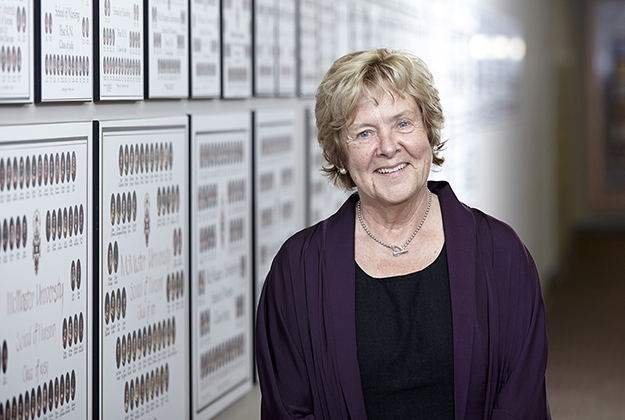McMaster and area nursing schools call for better licensing exam

'The students from our programs did better than average, but we are quite dismayed,' said Carolyn Byrne, spokesperson for the consortium and associate dean and director of McMaster’s School of Nursing. 'We know our programs produce well-prepared nurses, we are proud of our students, and we will put strategies in place to ensure their success.'
Officials at McMaster’s School of Nursing and its partners, Mohawk College in Hamilton and Conestoga College in Kitchener, are joining the call for a better licensing exam, after their graduates’ pass rate dropped significantly from the year before.
McMaster, Mohawk and Conestoga operate together in a consortium to offer a Bachelor of Science in Nursing (BScN) degree to more than 2,000 students from a variety of educational backgrounds.
In 2015, graduates of the consortium’s BScN program were required to write a new licensing exam, referred to as the National Council Licensure Examination (NCLEX-RN), between January and June.
This U.S. exam was introduced in January by the Canadian Council of Registered Nurse Regulators as a replacement for the former Canadian entrance to practice exam. The outcome was an average pass rate of 72 per cent, which represented a drop from the average of 90 per cent traditionally achieved when writing the previous College of Nurses of Ontario Registration Exam.
Graduates must be successful on the exam to become registered and practice as nurses.
The drop echoed the decline seen in NCLEX-RN pass rates across Ontario and Canada. Results for the same time period was 68.1 per cent in Ontario and 70.6 per cent for Canada, substantially lower than in previous years
Students who took the NCLEX-RN have complained it did not recognize Canada’s universal health care system; multiculturalism; use of the metric system; or Canadian medication names.
“The students from our programs did better than average, but we are quite dismayed,” said Carolyn Byrne, spokesperson for the consortium and associate dean and director of McMaster’s School of Nursing. “We know our programs produce well-prepared nurses, we are proud of our students, and we will put strategies in place to ensure their success.”
She was speaking on behalf of McMaster, as well as Paul Armstrong, dean of health sciences, community and urban studies at Mohawk, and Marlene Raasok, executive dean, School of Health and Life Sciences and Community Services at Conestoga.
The BScN program offered preparatory activities to better prepare students to write the new exam. Now they will survey graduates who have written the NCLEX-RN to learn where they did well, and the areas where more knowledge and preparation are needed.
They will also develop new strategies to provide additional support to students writing the NCLEX-RN in the future.
Byrne said officials for the three schools share the concerns of the Canadian Association of Schools of Nursing, the Council of Ontario University Programs in Nursing and others in calling for a licensing exam that better reflects Canadian nursing practice and the Canadian health care system.

